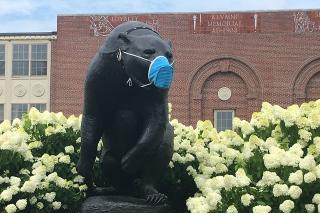Abraham Schechter ’98MS, the Portland Public Library’s Archivist and Special Collections Librarian, recalls the early days of the pandemic lockdown: “With libraries closed, I had to regroup and figure out ways to keep communicating with our patrons.” Schechter is part of a Library-wide effort to maintain an active blog of the life of the library.
“I started to ask patrons to tell us what things looked like from where they were,” he says. “It is an open invitation. A way for us to isolate together.” He also contacted the members of the journaling workshop he’d been teaching at the Library since 2016, knowing they might be likely contributors — this was when he began to receive submissions. The Library’s social media platforms have become vital for keeping in touch and collecting community anecdotes and images.
“I saw notices over library listservs,” recalls Greta Schroeder ’18MS, from the Thompson Free Library, “a number of libraries had started local archival collections around COVID-19.” She contacted other librarians to make it a coordinated, collaborative project across the state of Maine.
With Schroeder’s leadership, librarians and archivists around Maine have formed the Maine Contemporary Archives Collaborative, a group working to actively document history through collecting, sharing, and preserving the stories and materials of our community members. At weekly meetings, the group exchanges ideas, shares skills, develop cooperative outreach strategies, and offers general assistance and encouragement.
“This has been a blessing,” says Schroeder. “I’m in a rural part of Maine, without a big professional presence around me. I’ve been able to connect with professional archivists and librarians across the state. I hope someday we’ll get to meet in person.”
As a result of this collaboration, the Maine State Library and IMLS are supporting the effort by paying for the use of Omeka, a shared platform for public libraries in the state. Librarians in Maine encourage people to submit observations specific to their region and contact their nearest collecting library.
We’re building a local community resource.
Jill Piekut Roy ’20MS from the Patten Free Library was in her last term at Simmons and taking Rhiannon Bettivia’s digital preservation course when the pandemic moved everyone to online learning. She used the workflow assignment from Bettivia’s class to create a strategy for preserving a COVID-19 collection. “I synthesized what I learned in digital preservation for other librarians to suggest how to preserve their collections.”

“It’s a golden opportunity to share what archives are,” says Schechter. “First-person accounts are the stuff that archives are made of — these things are extremely valuable because they come from experience. These submissions are a document for the future.”
However, not all patrons are certain that their contributions are helpful. “I’ve had people say to me, would this be interesting? Is this something that you want?” says Piekut Roy. “I find that interesting, and it gives us a chance to educate.”
“Many of us have had some anxieties: Will it be successful? Will we get contributions?” adds Schroeder. “We are building a foundation to be prepared for these situations going forward, collecting contemporary materials, and that is the real success. In rural areas, it’s harder to have access to documents that show your local history and people that we know or remember. We’re building a local community resource.”
The pandemic isn’t the only subject the archive includes. One community member interviewed a mother and daughter about a Black Lives Matter protest they attended during President Trump’s visit to Puritan Medical in Guilford, Maine. “The daughter talked about her interactions with her classmates who were excited about Trump’s visit. They talked about the importance of speaking up for what you believe in.”
When skimming through the collection chronologically, changes are apparent. “The tone of the submissions has changed,” remarks Schechter, “We’re in the long haul now — it didn’t look like this in April.” Anna Faherty '18MS, '18MA, University of Southern Maine, noted the prevalence of submissions about being unable to visit relatives, “that has come up a lot in northern Maine.”
Hannah Stevens ’12MS is an archivist at the College of the Atlantic, where they have a large international student population. A work-study student suggested interviewing international students. “We want to include perspectives from people who aren’t from Maine but who call Maine home.” Stevens also notes that the collection will likely grow once the crisis has ended. “We are deep in the valley right now, but a lot of personal experience will be captured in retrospect.”
The Collaborative is working to create an educational program about archives, with lesson plans for K-12 students throughout the state, so they can learn about archives and perhaps contribute to regional collections in the process.
Renee DesRoberts ’06MS, Special Collections Librarian at the McArthur Public Library, says that for smaller organizations, “this is our first dive into digital archives and collecting digitally. We’re preparing ourselves for future archives, which is kind of amazing! I think regardless of what these special collections have, we’re all going to be better prepared to continue to collect materials for the future.”

